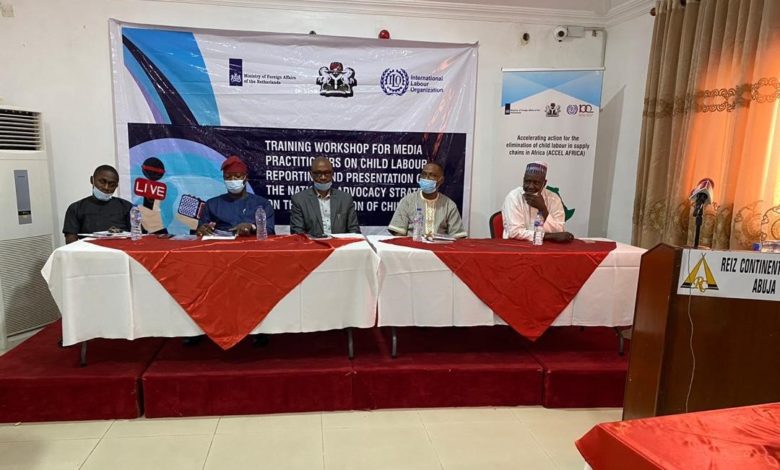ILO, Stakeholders Implore Newsrooms To Join Hands In Fighting Child Labour

The International Labour Organization (ILO), Ministry of Labour and Employment, and other participants at a workshop for journalists have charged media organisations to collaborate in addressing the problem of child labour.
This appeal was contained in a communique released on Thursday by the stakeholders. This followed a three-day training for media professionals on effective child labour reporting held in Abuja between Monday and Wednesday.
“Media professionals and their entire newsrooms should not work in silos but collaborate more by following up on the reports published by other media organisations and by forming networks or coalitions to collectively work on particular story ideas,” the groups recommended in a document shared with HumAngle.
“The Media needs to be engaged at the editorial and gatekeeping levels in order to have their buy-ins and make the jobs of reporters easier, thereby placing child labour issues on the front burner of regional, national and local discourse.
“On their part, Journalists must win over and court the professional fancy of their editors, managers, and media gatekeepers in their anti-child labour reporting to ensure their stories and reporting plans are supported at the highest levels.”
They recommended that advocacy agencies responsible for the promotion of child labours, such as the National Orientation Agency (NOA), should be supported with increased funding and capacity building.
“The management of the NOA needs to engage more with media practitioners to amplify its messages on relevant government policies relating to child labour. Also needed by the NOA is more transparency from other agencies and departments of the government on their projects in order to create common grounds for collaboration on identified issues,” they added.
They further encouraged government officials to cooperate with journalists who approach them for access to information. Towards this end, government officials were urged to share the contacts of their response desks with reporters to bridge the communication gap with the media.
The workshop organised earlier in the week sought to strengthen the link between media practitioners and implementing partners, improve journalists’ understanding of child labour, and reinforce their capacity to report on related issues.
It was put in place by the Accelerating Action for the Elimination of Child Labour in Supply Chains in Africa project (ACCEL Africa) with support of the Government of the Netherlands.
Addressing the participants during one of the sessions, Professor Abigail Ogwezzy-Ndisika, former Head of the Department of Mass Communication, University of Lagos, said the aim of the project was to make the society safer for children and hold the government accountable.
She encouraged them to interrogate to what extent existing laws on child rights are being implemented using solutions and investigative journalism.
“Pick something and pursue it till you get results,” she urged. “If we can push the government to do the needful, that is fine. We should follow the few reported cases we have through to a clinical conclusion so that they begin to serve as deterrence to others.”
Agatha Kolawole, National Project Coordinator of the ACCEL AFRICA Project, asked media practitioners at the events to send story pitches that can be supported by the ILO.
About 30 journalists from online, print, and broadcast media outlets participated. Other participants included representatives from the Nigerian Labour Congress (NLC), Trade Union Congress (TUC), Economic Community of West African States (ECOWAS), National Orientation Agency (NOA), Nigerian Employers Consultative Association (NECA), Ministry of Mines and Steel Development, and Ministry of Labour and Employment.
Support Our Journalism
There are millions of ordinary people affected by conflict in Africa whose stories are missing in the mainstream media. HumAngle is determined to tell those challenging and under-reported stories, hoping that the people impacted by these conflicts will find the safety and security they deserve.
To ensure that we continue to provide public service coverage, we have a small favour to ask you. We want you to be part of our journalistic endeavour by contributing a token to us.
Your donation will further promote a robust, free, and independent media.
Donate HereStay Closer To The Stories That Matter




